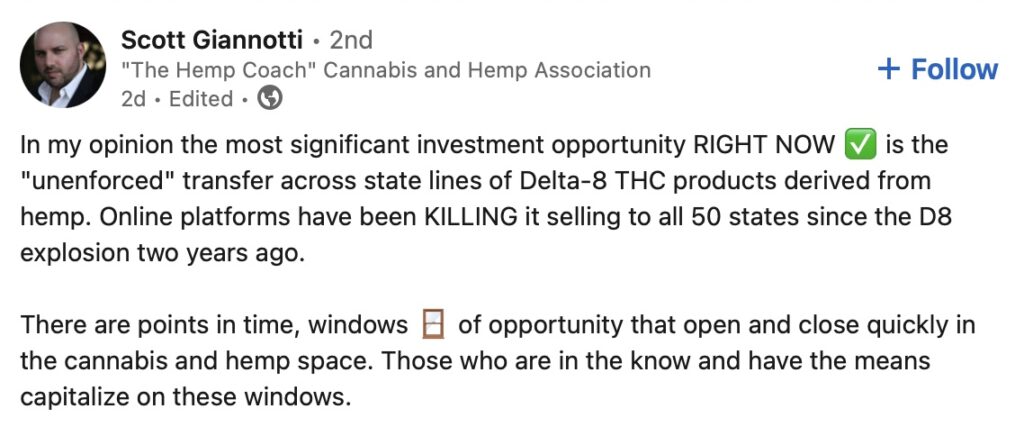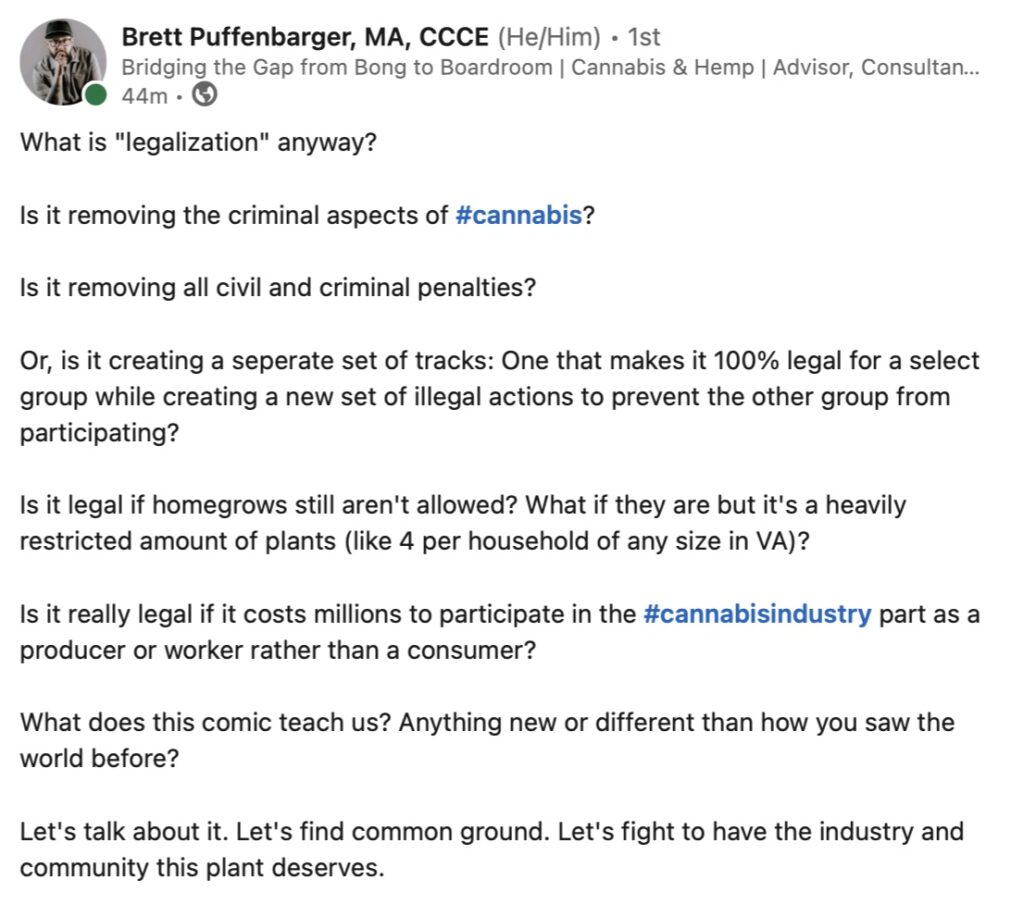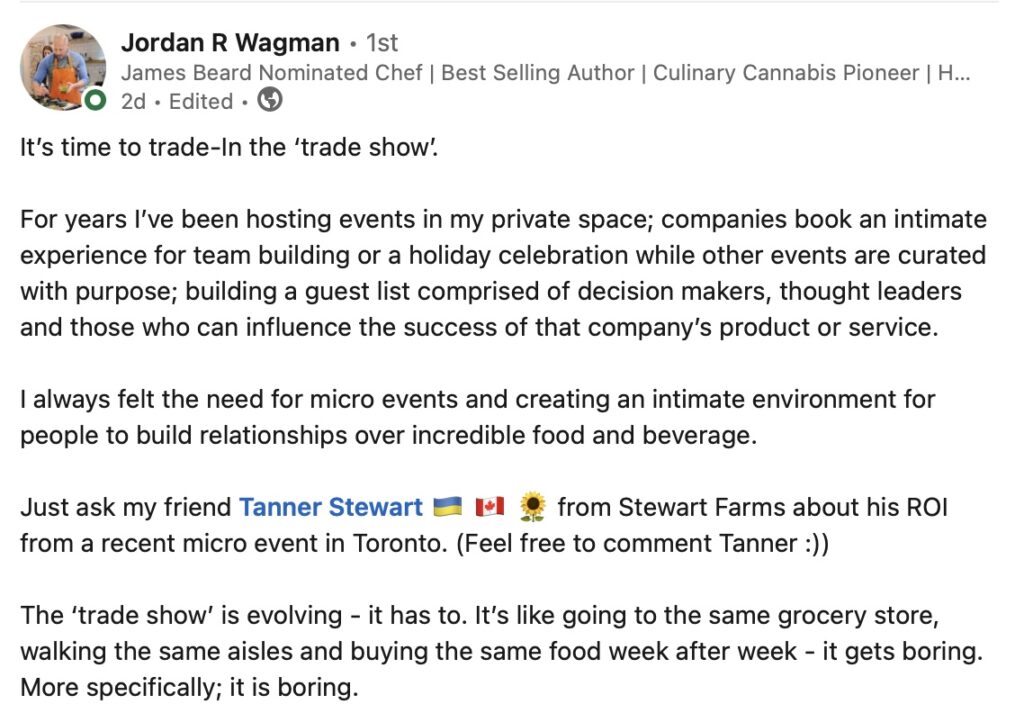12 July 2022 | Cannabis
The great D-8 debate, what legalization means, and ditching the traditional cannabis trade show.
By Kaitlin Domangue
The great D-8 debate

Scott’s whole post dives deeper into the regulations, but I couldn’t fit it all here.
“Delta-8 THC products are a lightning rod for controversy as many are fighting to eliminate it from the market or regulate it more tightly,” Scott says in his post. “I believe that for the time being, as it is legal and sold ethically, it is a legitimate business opportunity, and a great opportunity for the public to gain familiarity with the effects.”
A lightning rod of controversy is right.
3Chi was the first company to sell delta-8 products in September 2019, both online and in brick-and-mortar locations. Since then – the cannabis industry has absolutely erupted.
Half the industry launched a delta-8 business hoping to cash in. And the other half stayed far away, predicting the feds would soon put a crushing end to the THC loophole.
But, a panel of the U.S. Court of Appeals for the Ninth Circuit said delta-8 THC products are generally legal in May, by way of hemp’s legalization in the 2018 Farm Bill. Delta-8 THC is derived from hemp but is an intoxicating cannabinoid, just like delta-9 THC is.
Several states have already introduced their own delta-8 rules, though. Vermont was one of the first in May 2020, banning “synthetic cannabinoids in the production of any hemp product or hemp-infused product”, which includes delta-8.
Only 3 U.S. states have clear rules allowing CBD-derived delta-8, according to Scott’s post. They are Maine, New Jersey, and Washington D.C.
Delta-8 is either illegal, unclarified, or legal without clear rules in the 47 other states.
What I’m Thinking 🧠
I disagree with this post’s general theme: delta-8 is a gray area, so let’s take advantage of it.
First – most commercial delta-8 is synthetic.
Delta-8 isn’t naturally occurring in hemp in high amounts, which is concerning to chemists who say commercial delta-8 is synthesized CBD. I don’t agree with synthesizing and packaging cannabinoids, especially when science about its safety and effects is limited.
Second – unenforced doesn’t equal legal.
Just because we can do something, doesn’t mean we should. It’s never easy or risk-free operating in a gray market, no matter how much money you’re making. The delta-8 reward doesn’t outweigh the risk to me.
The cannabis industry’s regulations are frustrating and restricting, but I firmly believe that it’s always better to operate within the bounds of the law as we demand respect and legitimacy.
What does legalization mean?

Brett is always asking the right questions.
Recreational cannabis is legal in 19 states and medical cannabis is legal in 37 states. In countries like Canada and Uruguay, cannabis is federally legal throughout the nation.
To each country, state, and local government – cannabis legalization seems to mean something a little bit different.
California’s legal cannabis market is the largest in the world. It’s often cited as the “Mecca of cannabis.” Most people believe anything goes when it comes to cannabis in California.
But, at least 34,000 California cannabis records haven’t been processed by the state’s courts. Additionally, 56% of California’s cities and counties have opted out of allowing cannabis businesses to operate in any capacity.
Most people pay an average of $5,000 just to apply for a cannabis business license, but it depends on the state. Illinois’ medical cannabis dispensaries that applied for early-approval recreational licenses shelled out $30,000 in fees.
All states with home grow laws restrict the number of plants you can grow to a certain amount.
Legalization looks different everywhere.
What I’m Thinking 🧠
I think about this a lot. What does legalization really mean?
The federal government has no business regulating our personal transactions and home grows, in my opinion. If you want to grow 50 cannabis plants and gift them to your friends and family: you should be able to do that.
When it comes to commercial businesses, however, there needs to be oversight and transparency. People shopping at a dispensary are expecting safe, tested products.
A February 2020 market analysis found that close to 3,000 businesses in California operate without a license. I understand the circumstances surrounding California’s legal industry, but I’m not on board with unlicensed cannabis operations.
Cannabis regulations will always be fragmented until federal legalization arrives.
And where there is room for states to make decisions post-legalization – there will likely still be some fragmentation.
The bottom line:
- All non-violent cannabis “crimes” need to be expunged, right away, in all 50 states.
- Cannabis needs to be removed from the list of scheduled substances.
- The government needs to stay out of home grows and personal gifting transactions, aside from making laws forbidding access to children.
- All cannabis businesses serving the general public, either via B2B or B2C transactions, need to be licensed and held accountable so products remain trustworthy.
- Let citizen-led initiatives in individual states and counties lead the way when it comes to opting in or out of commercial cannabis activity within their borders.
It’s time to trade in the trade show

“We can no longer use the post-pandemic excuse that ‘everyone just wants to get together‘ because we don’t,” Jordan continues in his post. “It worked for a while, and I subscribed to that sentiment, but now the world has opened up and people are craving something more. Something unique.”
Jordan goes on to highlight several events and event groups for bringing something special to the cannabis event space.
“I fell in love with the InternationalCBC in Spain and believe Alex Rogers has curated a unique environment for education and B2B relationship building,” Jordan writes. “George Jage and Kim Jage and MJUnpacked have gone against the grain to create a more inclusive, hyperfocused offering to the attendee.”
The Green Paper hosted a Los Angeles event in March and our St. Louis event is happening at the end of the month. Beyond that, I’ve attended several cannabis events and watched several cannabis events play out.
The sentiment is always the same: everything is overplayed and has been talked about 1,000 times. Cannabis events are getting stale.
Our Los Angeles community event was a huge success – we got terrific feedback from our guests and are planning to have a similar style in St. Louis.
The guest list was smaller and the conversation was natural, involving the audience as much as possible. The conversation was also about the California market, we didn’t have a broad conversation for a hyperlocal audience.
The Cannabis Marketing Association hosted a recent get-together and I’ve never seen so much positive organic feedback after a cannabis event.
What I’m Thinking 🧠
I’ve written about cannabis micro-events before.
Treating each sector of this space as its own microindustry leads to more intimate and focused events.
When you work for a cannabis payment processor, you don’t need cultivation knowledge. You need fintech knowledge. Attorneys aren’t studying the endocannabinoid system, they are studying law.
As the cannabis industry matures, it’s time to trade our wide net for a deep one. Large events like MJBizCon have their place, but introducing micro-events is a crucial component of driving change.